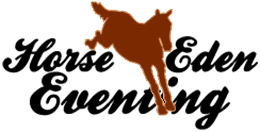| |
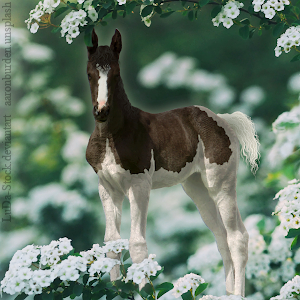
|
So the horse I'm currently riding has a problem where he follows around every horse in the arena, then pins his ears and tries to kick at them if they get too close. He brings it upon himself by following them but then lashes out... He's always twisting and pulling in the direction of other horses, making him hard to keep in line or ride in general. Any tips on how to fix this issue? |
|  |
|
| |
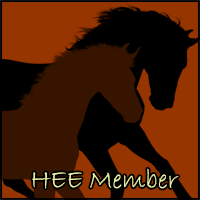 |
I'm not in any way a horse trainer nor do I frequently work with horses with bad vices such as this.
But I suggest you take him in the arena with other horses, hop on him, and just make him stand quietly. Let the other horses pass right by him. If he tries to go forward or lash out at one, reprimand him by adding pressure to his mouth and back him up. Add a voice command every time you do so when he acts up. That way, he connects the voice command to the unwanted pressure on his mouth. Gradually you'll stick that into his mind and only have to use the voice command for him to connect it to the bad feeling and he will expect that feeling to come and will stop. Just some things I've picked up on from my trainer who is an instructor as well as trainer. She breaks and trains a lot of the hunter horses at my barn. |
|
|
| |

|
|
| |
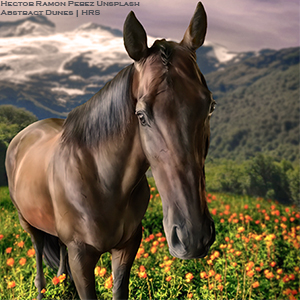
|
Why are you allowing him to follow the other horses? During group lessons, I never get close enough to another horse/rider - I either pass them wide on the inside (and say 'passing left' or 'passing right') and keep my distance. As a rider, it is your responsibility to keep control of and guide him. It sounds like you may not have established that boundary yet so he tries to get away with what he can. |
|  |
|
| |

|
It's not that I try to let him follow other horses, he's a large horse and was taught that when he was younger, so that's just his mindset. Being so big, he's harder to control. Even my instructor has issues with him. We're trying to break him of the habit, and I'm simply asking for tips on how to effectively do that. Our arena is fairly small which gives him the advantage of being in closer contact with the other horses. |
|  |
|
| |
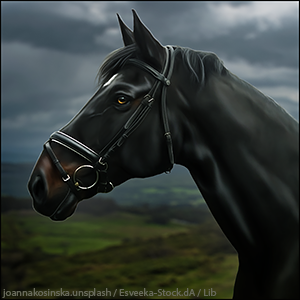
Moderator |
I personally wouldn't get on him if he doesn't respect you enough to listen while you're up there. If he's trying to kick, you don't want anyone or yourself getting caught in the middle of a brawl.
I would suggest working on ground manners first. Demand his attention and allow him to focus on you, not horses. When he understands his position, then introduce a horse or two. Make him focus on you, on the ground, and not anyone else.
If he gets it, then hop on and repeat. Get your commands & cues straight while there's no other horses to focus on. Then introduce 1 or two and work with him until can behave.
Don't go too fast cause he'll forget all about you. |
|  |
|
| |

|
Alright, thanks Coldwater ^^ |
|  |
|
| |
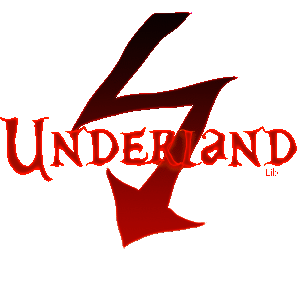
|
This can turn very dangerous very quickly. If even your instructor has trouble with him you shouldn't be put in a position where you have to try and control him. Ride him by himself or find a trainer that can fix the issue.
With a horse like that we always did a drill where, keeping AT LEAST one horse length apart, we would ride in a line and have the first horse trot off away from the other horses until it was at the back of the line, then the next horse would do it and so on. We would make sure the problem horse had lots of horses coming towards him and then leaving as well, until he could be ridden abreast but at a safe distance. You must have the ability to control him during this exercise though and if are not able to do not, I repeat, do not, put yourself in a position that could lead to him striking out at another horse. |
|
|
| |
 |
I agree with many things others have said here.
In 4-H we have rules for horses like this, for example, we MUST keep at least one horse length between us. Another is if the horse is at risk of kicking other horses, a red ribbon must be tied in their tail, that way everyone knew to keep extra distance.
Another thing would be to just ride by yourself in the arena.
If that is not possible, then you need to go back to the basics.
The very first thing I was taught as a 2 year old, was to be the boss. You need to be the boss, you are responsible for your horse, and you are responsible if your horse hurts someone else/their horse.
Instead of riding, take sometime to do ground work, teach him those manners that he should have had from a foal. For example, pretend you are getting ready for a halter show, you want your horse to be the best there, therefore, he needs to behave his best. Whats worse than having a pigheaded horse in a halter class that can't stand still? He will end up hurting someone! (I have had this happen to me, granted it could have been way worse!) Have someone help you while you do this, they can pretend to be the judge, and give pointers.
Feel free to pm me with questions ;) |
|
|
